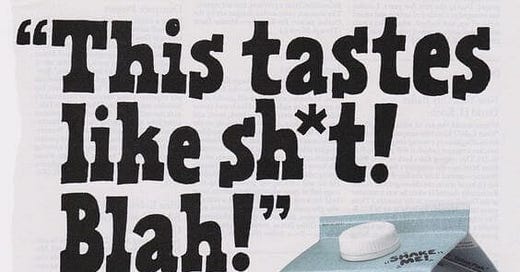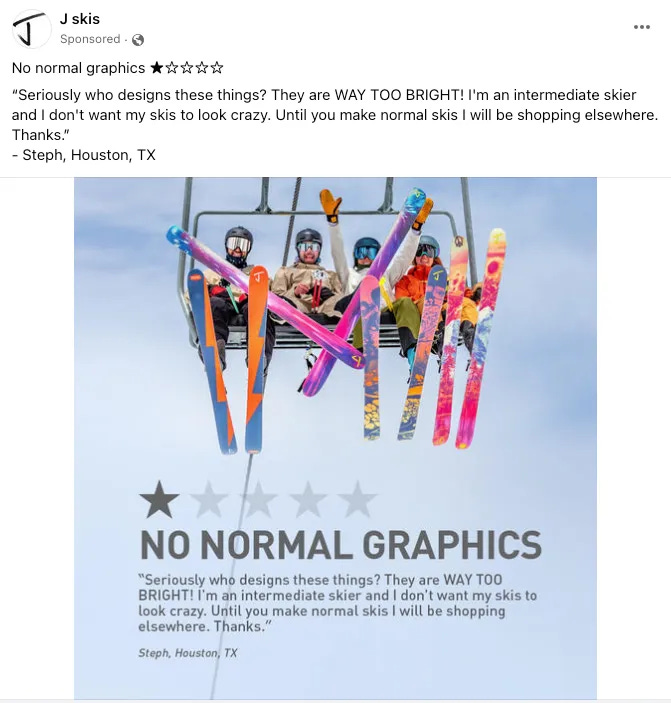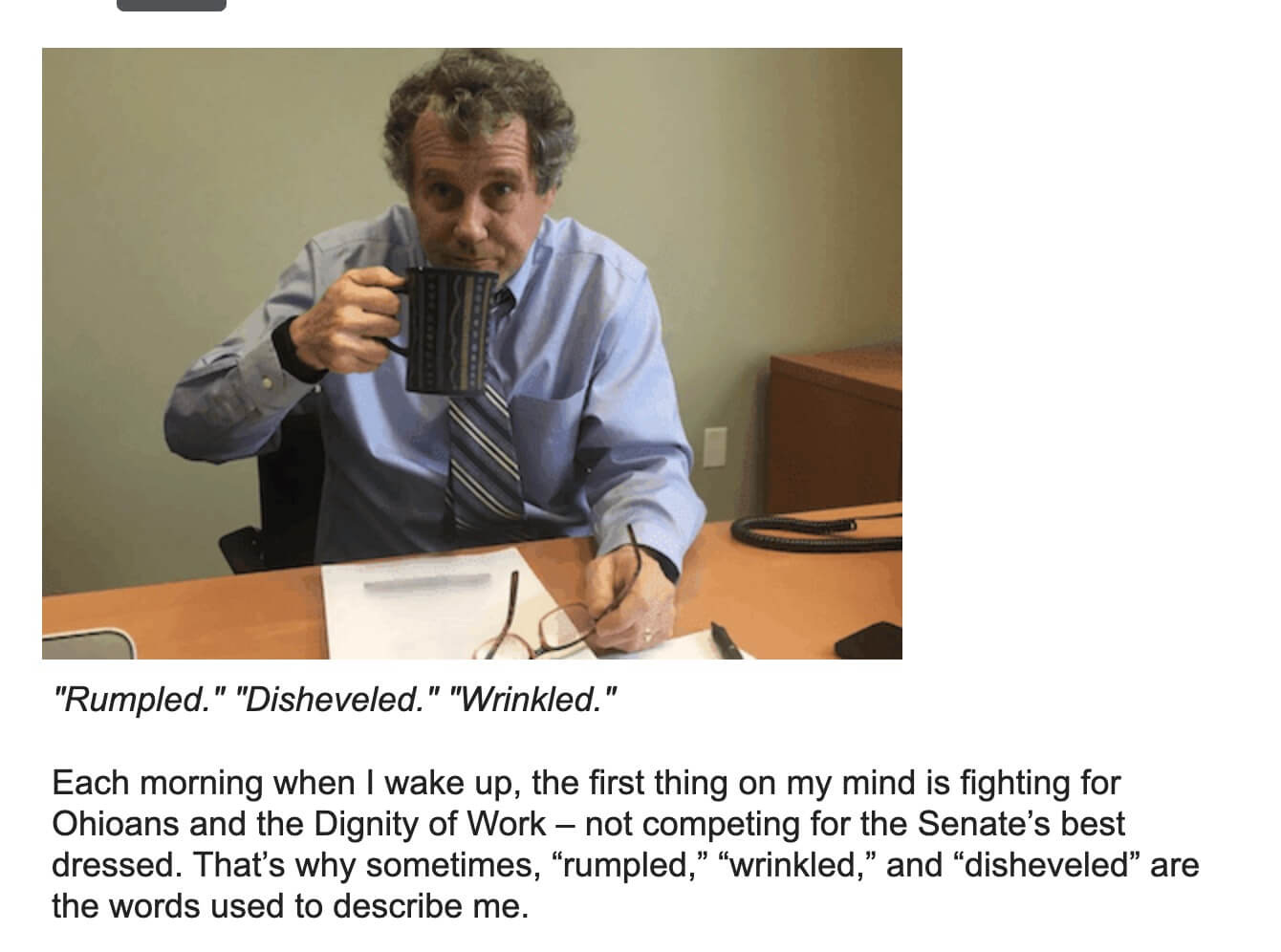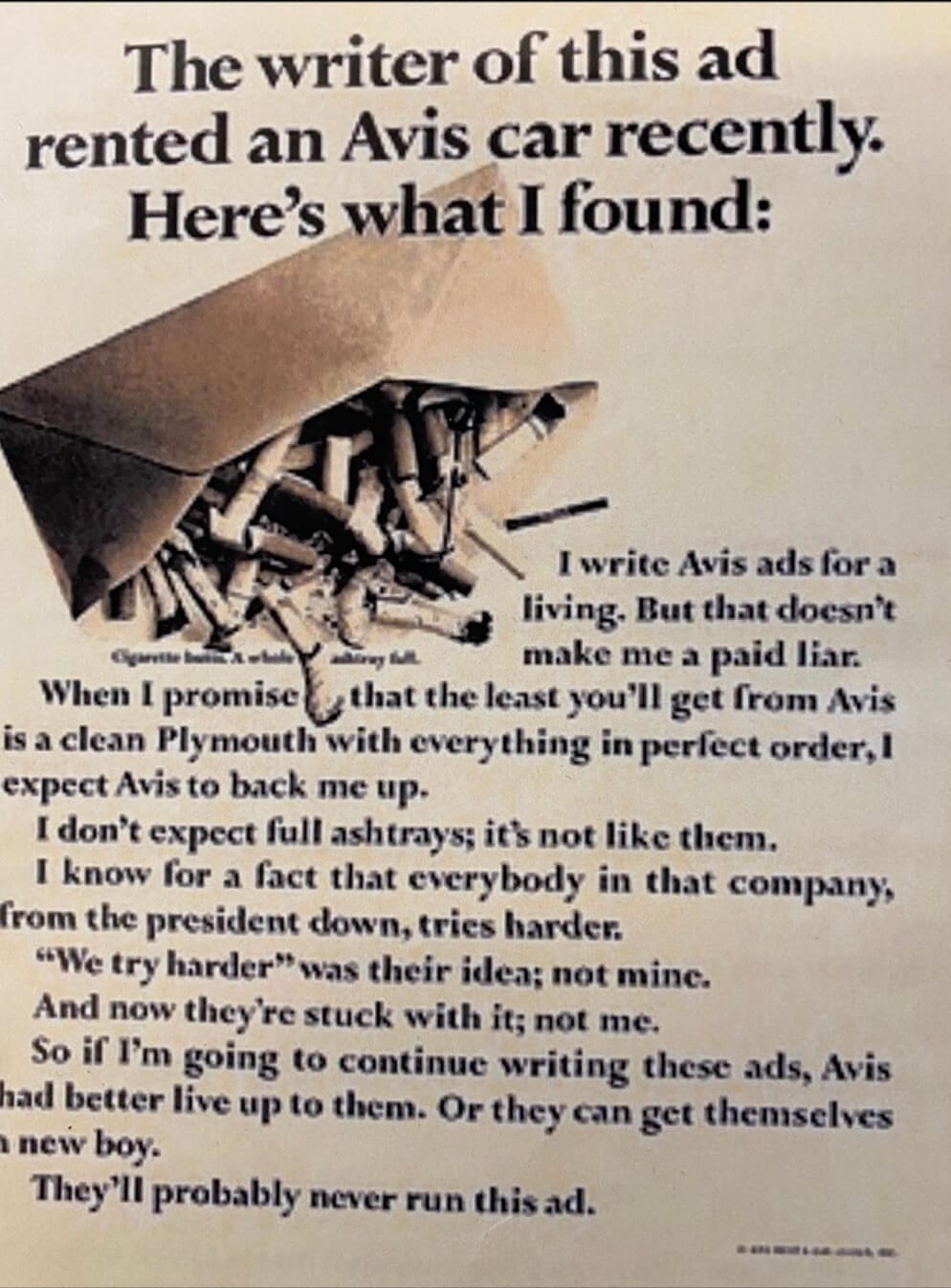This email tastes like sh*t, blah!
Actually, it's about how to turn a negative product attribute into a positive selling point
Hello Gobbledeers,
How’s it going? First, welcome to the 200 or so of you new subscribers who’ve joined in the past couple of weeks. Great to have you here!
Appropos of nothing gobbledy-related, I saw Willie Nelson perform over the weekend. He’s 90. 90 years old (just to clarify). And amazing. An American treasure. If you haven’t seen him, you should go. I told myself every summer for years that I should go see Frank Sinatra (even though 1991 Sinatra wasn’t exactly prime Sinatra.) I didn’t see Sinatra, of course, because I’m an idiot, and here I am 32 years later still whining about how I never bothered to go see him. Whenever I’ve decided to just go suck it up and see someone because I think I should seen them at least once, I’m glad I did it. Even if they weren’t everything I hoped for (I’m talking to you, Neil Diamond). I guess what I’m saying is - you should go see Willie Nelson.
Senator Sherrod Brown Is a Mess (He Admits)
We’ve talked here about one of my favorite under-utilized messaging tactics - taking your perceived worst qualities and turning them around to be a positive. You may remember the ad I shared from a ski company that was just a negative review of their skis saying they’re too colorful and their designs are crazy.
I live on the Upper West Side in Manhattan, which is not exactly known as a party neighborhood. There’s a bar right near me that has a sign outside it that has a quote from a Yelp review of the place — “A copy of a copy of a copy of a cool downtown bar.”
If you know who you’re targeting, bad reviews can be used to show that either you’re part of the tribe or you’re not.
Which is why I loved the idea of an email I received from Ohio Senator Sherrod Brown.
(But first, let me note that apparently the Democratic Party Fundraising Apparatus (tm) does not believe in allowing unsubscribes. No matter how many times I unsubscribe, the emails keep coming. Which I’m now grateful for because had they actually allowed me to divorce myself from their pleas for cash, I wouldn’t have received the email I mentioned.)
Here is the email:
I know, he could certainly un-rumple, iron his shirts, and shevel (?) himself while still fighting for Ohioans and the Dignity of Work. Also, I don’t know why “Dignity of Work” is capitalized. Unless Ohioans and the Dignity of Work is a band. Maybe it is, I don’t know. Maybe he’s fighting to get Ohioans and the Dignity of Work to play at the Grog Shop in Cleveland Heights.
In any case, politicians don’t typically admit to having a weakness - part of being in that industry is “fighting for every man, woman and child in the great state of” wherever. Which is why this approach - my opponents are correct, I’m a mess - is almost really good.
It’s almost really good because while I get what he’s trying to do with the “I’m too focused on my constituents to go to the dry cleaner” thing, it’s missing how the negative is really a positive. That ski ad is brilliant because there’s a market for colorful, weird ski designs, and what better way to emphasize that than a complaint that the designs are too colorful and weird. (Or the sign outside the bar which suggests that while we’re not as cool as a downtown bar, we’re cool enough to admit we’re not that cool, just like many of us on the Upper West Side.)
I don’t believe I’ve ever seen this approach used in software, which means it hasn’t been overused (unlike the word “enterprise.”). I just randomly looked up a company (MYOB) on G2 to find a bad review and see how this could work. There was a 1-star review where the reviewer said the product was hard to use and “Not for beginners.” I can imagine “Not for Beginners” being a selling point if you’re selling to well-tenured buyers.
Can someone try this, please?
Avis Did Try This Years Ago
Avis Car Rental has the best example of this approach in an ad they ran in the 1960’s:
They built a decades-long marketing campaign around the idea that because they’re number 2, they try harder. They took a negative (they’re not the biggest car rental company) and turned it into a positive (because we’re not the biggest, we’re just going to have to try harder to win your business).
This ad, in particular, is both clever (written from the point of view of the copywriter), but also hammers home the “we try harder” message. Clever is easy. Clever while delivering the message is hard.
Oatly’s Marketing Is Not Sh*t, Blah!
I’m giving a presentation in a couple of weeks1 and as part of that I was thinking about what I would tell people this newsletter is about.
After some contemplation, I decided it’s about how positioning, messaging and copywriting fit together. Specifically:
How positioning is generally neglected.
How there’s a focus on messaging but a lack of clarity about what to say because positioning was neglected.
How there’s basically zero understanding of (or appreciation for) great copywriting.
But every-so-often positioning, messaging and copy align and it’s magic.
Behold, this Oatly ad:
If you can’t read that copy, it says:
That’s a real comment from a real person who tried one of our oatmilks for the first time. Some people just don’t like it. They think it tastes like oats, because it does taste like oats. Here’s the good part. If you don’t like the taste of our oatmilks, you don’t have to drink them. Taste is personal which is why we don’t take it personal if you don’t like how they taste.
There is, however, a growing number of people who find oatmilk delicious. Who can taste the balance of protein, fiber, unsaturated fats and carbs and know that it makes them feel good. So, give it a go and if you don’t like it you can always give it to someone you don’t like. That’s what business students call a win-win.
If you’ve read better copy in the last year, I’d love to hear about it (seriously - if you have an example, share it in the comments). Because that’s the best goddamned copy I can remember in quite some time.
And it’s the best goddamned copy because it flows out of clear positioning and messaging, and couples those with a unique brand voice.
Here’s how you can do the same thing at your company:
First, leave your company and find a CEO who actually thinks this is important.
Har har.
Moving on… Oatly is positioned as a milk alternative - for people who are anti-milk for any number of reasons, it’s meant to be used in all the ways milk is used. Which is to say - it’s not positioned as a “health food,” it’s positioned as milk, except without making the person drinking it feel a little sick.
(This was a conscious choice, and a choice that the newfangled vegan meat alternatives also have had to address. Beyond Meat, for example, is positioned as an alternative to hamburgers. Impossible is positioned as an alternative to where you’d use ground beef in cooking. In other words, one is positioned as the final product, the other as an ingredient).
Oatly’s messaging comes out of that - it has all of the nutrients (fiber, protein, unsaturated fats) of regular milk, so you’re not going to lose the (alleged?) health benefits of milk. But they also want you to know that it doesn’t taste like milk. There’s another non-dairy milk product from a company called Malk. Malk is meant to directly evoke milk. Malk doesn’t say “our Malk doesn’t taste like milk.” Oatly does say that. That’s a key piece of their message.
Oatly is a challenger brand, and they’ve embraced that by being provocative in their copy. They lead with a technique we’ve discussed here a bunch - the “it’s not for you” technique. “This tastes like sh*t, Blah!” grabs your attention. It’s a challenge to the buyer - do you think it tastes like sh*t, Blah?
“Some people just don’t like it. They think it tastes like oats, because it does taste like oats.”
I don’t know what Malk is made of. But I do know that Oatly owns “oats.” So they’re going to embrace “oats” and they’re not going to apologize for making a product that tastes like oats. And if you don’t like the taste of oats, that’s fine. But if you do, there’s “a growing number of people who find oatmilk delicious.”
You’re part of the tribe.
There’s an us, and a them.
And it’s fine to be a them. A them thinks this stuff tastes like sh*t.
But if you’re one of us, it’s because you think this stuff is delicious.
Creating the tribe is probably the most brilliant part of Oatly’s marketing. It’s one thing to be clear about who you’re for (people who like the taste of oatmilk and don’t want to drink dairy milk). And it’s one thing to work actual product benefits into the copy (protein, fiber, etc). And it’s one thing to be amusing while doing it (“if you don’t like it you can always give it to someone you don’t like.”).
But to do all that AND create an “us vs. them” - a clear tribe to be a part of? That’s amazing.
In the rare occasions where I see software marketing done well, it’s always missing that final piece. The software may do the thing you need it to do, but it doesn’t make you part of something larger. And if you’re not a part of something larger, it’s pretty easy to move on from that product when something shinier or cheaper comes along. The tribe ensures loyalty (as an Apple customer or University of Michigan grad can tell you).
Go Blue.
(Thanks to the Demand Curve blog for sharing that ad).
As always, thank you for reading (and especially for sharing) Gobbledy.
I’m always happy to chat - here’s my Calendly link. If you want some feedback on something you’re working on, or want some help finding the positive selling points from your negative product attributes, I’m here.
Do you want someone to speak at an event you’re having? Or a team meeting? Or an offsite? Or onsite? I’m someone! I’m available for those different types of sites. And I have references (note to self: ask people for references). And some of those references will probably say good things. And some of THOSE will probably say good things specifically in reference to me speaking at their event.








You reminded me of this 1970s Barney Frank campaign poster... https://www.worthpoint.com/worthopedia/1970s-barney-frank-neatness-isn-1865456819
Hey, I like Oatly.